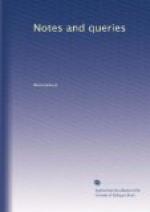“Rejoice, ye good writers, your
pens are set free;
Your thoughts and the press are
at full liberty;
For your king and your country
you safely may write,
You may say black is black,
and prove white is white;
Let no pamphleteers
Be concerned for their ears;
For every man now shall be
tried by his peers.
Twelve good honest men shall decide
in each cause,
And be judges of fact, tho’
not judges of laws.”
In the third verse are the lines Lord Mansfield cited from memory:—
“For Sir Philip well knows
That innuen-does
Will serve him no longer in verse or in
prose;
Since twelve honest men have decided
the cause,
And were judges of fact, tho’
not judges of laws.”
Lord Campbell and Mr. Harris both make another mistake with reference to this ballad which I may perhaps be excused if I notice. They say that it was composed on an unsuccessful prosecution of the Craftsman by Sir Philip Yorke, and that this unsuccessful prosecution was subsequent to the successful prosecution of that paper on December 3rd, 1731. This was not so: Sir Philip Yorke’s unsuccessful prosecution, and to which of course Pulteney’s ballad refers, was in 1729, when Francklin was tried for printing “The Alcayde of Seville’s Speech,” and, as the song indicates, acquitted.
C.H. COOPER.
Cambridge, July 29. 1850.
* * * * *
NOTES ON MILTON.
(Continued from Vol. ii., p. 115)
Comus.
On l. 8. (G.):—
“After life’s fitful fever he sleeps well.”
Macbeth, iii. 2.
On l. 101. (M.):—
“The bridegroom Sunne, who late
the Earth had spoused,
Leaves his star-chamber; early
in the East
He shook his sparkling locks.”
Fletcher’s Purple Island C. ix. St. 1.
On l. 102. (M.):—
“And welcome him and his with joy
and feast.”
Fairfax’s Tasso, B. i.
St. 77.
On l. 155. (D.):—
“For if the sun’s bright beams
do blear the sight
Of such as fix’dly gaze against
his light.”
Sylvester’s Du Bartas. Week i. Day 1.
On l. 162. (G.):—
“Such reasons seeming plausible.”
Warners Albion’s England, p. 155. ed. 1612.
On l. 166. (G.):—
“We are a few of those collected
here
That ruder tongues distinguish villager.”
Beaumont and Fletcher’s Two Noble Kinsmen, iii. 5.
On l. 215. (G.) “Unblemished” was originally (Trin. Coll. Cam. MSS.) written “unspotted,” perhaps from Drayton:—
“Whose form unspotted chastity may take,”
On l. 254. (G.) Add to Mr. Warton’s note, that after the creation of Sir Robert Dudley to be Earl of Leicester by Queen Elizabeth in 1564, “He sat at dinner in his kirtle.” So says Stow in Annals, p. 658. edit. 1633.




